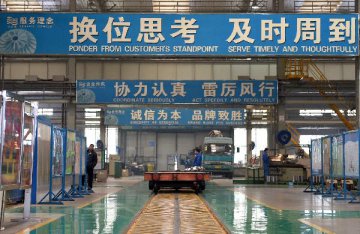
Chen Zhuo, a farmer from Yushu City, Jilin Province, had a good corn harvest, but he is worried about what to grow next year. "There are too many people growing corn these days, so prices are falling," Chen said.
"I don't know whether I can turn a profit if I stick with corn next year." China's corn industry is experiencing a surplus crisis after years of preferential policies caused rapid expansion and excessive corn supply.
China began buying corn in the northeastern region for state reserves in 2008 to protect local farmers from the global financial crisis. For years, the policy kept corn prices stable and high.
With state reserves too high, authorities announced plans in June and September to slash production in 2016 and partly remove favorable policies, which have caused corn prices to tumble.
According to a report by the Futures Daily this week, the market volume of corn is high in the provinces of Heilongjiang, Liaoning, Jilin and Inner Mongolia Autonomous Region, and prices of corn and corn products in these major production bases have fallen in the latter half of 2015 due to excessive supply, weak demand and increased cheap imports.
It forecast even more price slips for the industry as China cut the purchasing price of corn for state reserves by 10.7 percent in September, the first such move since the policy went into effect in 2008.
Many corn farmers are already complaining about the cuts in government purchasing. "I have not experienced losses yet, but all of my benefits are gone," said Li Qing, a farmer from Donghuo Village in north China's Hebei Province.
"I want to halt sales until prices climb again." Experts say the crisis is the result of previous government intervention against market laws and urgent measures need to be taken.
RAPID EXPANSION
China's corn industry expanded rapidly in recent years thanks to government support and the crop's adaptability. In the country's northeast, a region known as "China's granary" for its highly productive black soil, corn production became a pillar industry as local authorities urged more corn cultivation to "shore up China's food system." Official statistics show that the area of corn cultivation in Heilongjiang, Liaoning and Jilin expanded from about 6.3 million hectares in 2003 to about 11 million hectares in 2014.
"Many local farmers who previously grew soybeans and rice have switched to growing corn, which has damaged the grain structure in the northeast," said Wu Xinghong, head of the Jilin Academy of Agricultural Sciences. With greater production came slowdowns in sales. To boost corn sales, local authorities subsidized corn processing to consume the excess corn.
In 2008, the central government aimed to protect farmers from the global financial crisis by purchasing corn from them at high prices, which further encouraged the industry's expansion, even though demand was stagnant.
Currently, corn fodder processing, cornstarch processing and corn ethanol production are all reporting losses. The capacity utilization rate has fallen to 46 percent in factories, a historic low.
Meanwhile, corn in storage in the region stands at 160.4 billion kg, accounting for 78 percent of the country's total. "The northeast faces huge pressure to store more corn, and buying corn is putting great financial pressure on the central government," said Song Haihe, head of the Jilin branch of China Grain Reserves Corp.
"This is the result of a snowball effect." The rapid expansion has also harmed the rich black soil there as farmers apply more fertilizer to boost production. The average amount of fertilizer used has reached 434 kg per hectare, 1.93 times the national safety limit.
"BREAK THE VICIOUS CYCLE"
As urgency for change mounts, it is necessary to break the vicious circle, said Liu Xiaoran, an official with the China National Association of Grain Sector. "The original purpose of government support for the corn industry was to help farmers, but now it is hurting them," Liu said.
"The corn and corn processing sectors have become too reliant on government subsidies, which have disturbed the pricing mechanism for the products." Liu added that instead of intervention, the government should let the market play the decisive role if it wants to stave off the crisis.
Chinese authorities are already taking action by letting the market play a bigger role. Earlier this year, central officials conducted surveys about the policy of purchasing corn for state reserves in the northeast, which led to the policy change in September.
In June, the Ministry of Agriculture ordered local officials to decrease corn cultivation next year. "Giving a bigger role to the market may cause farmers pain at the moment," Liu Xiaoran said. "But it's a pain worth having, in the long run."
Industries > Consumer Products and Services




















Latest comments